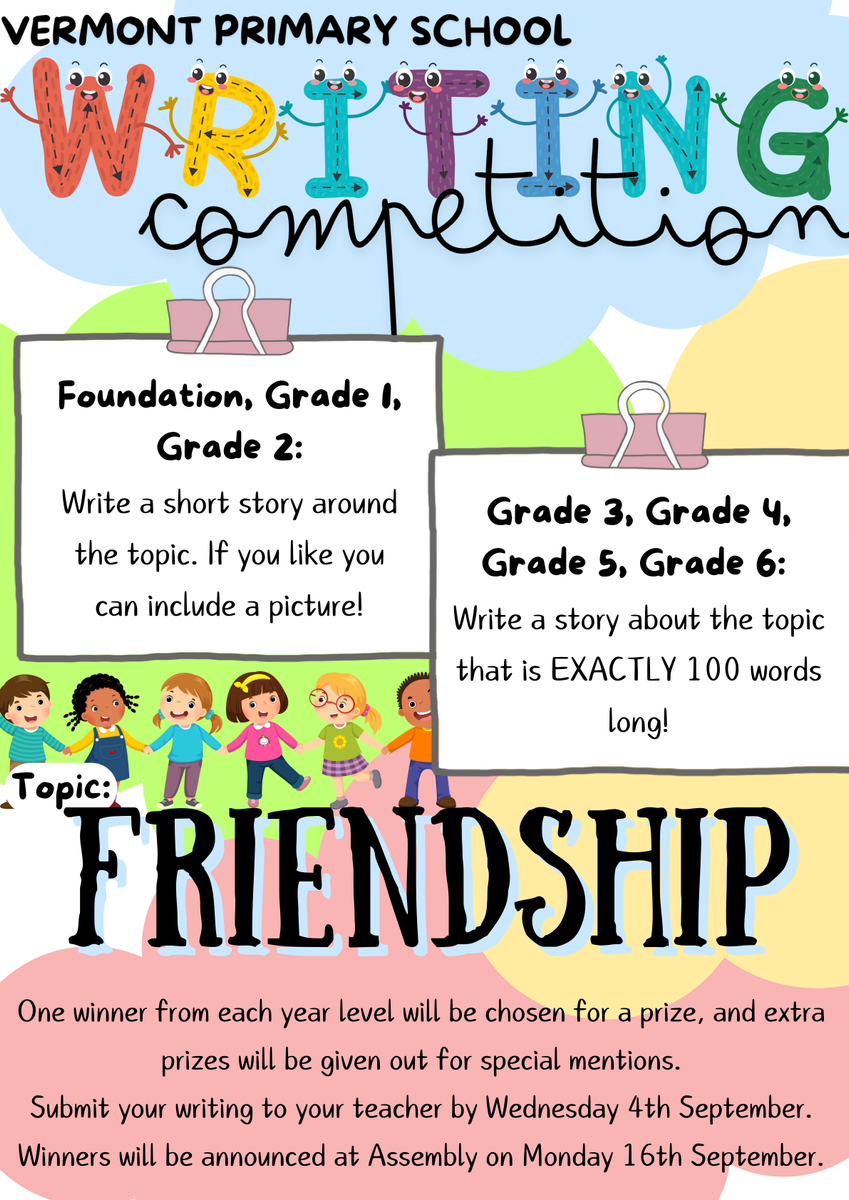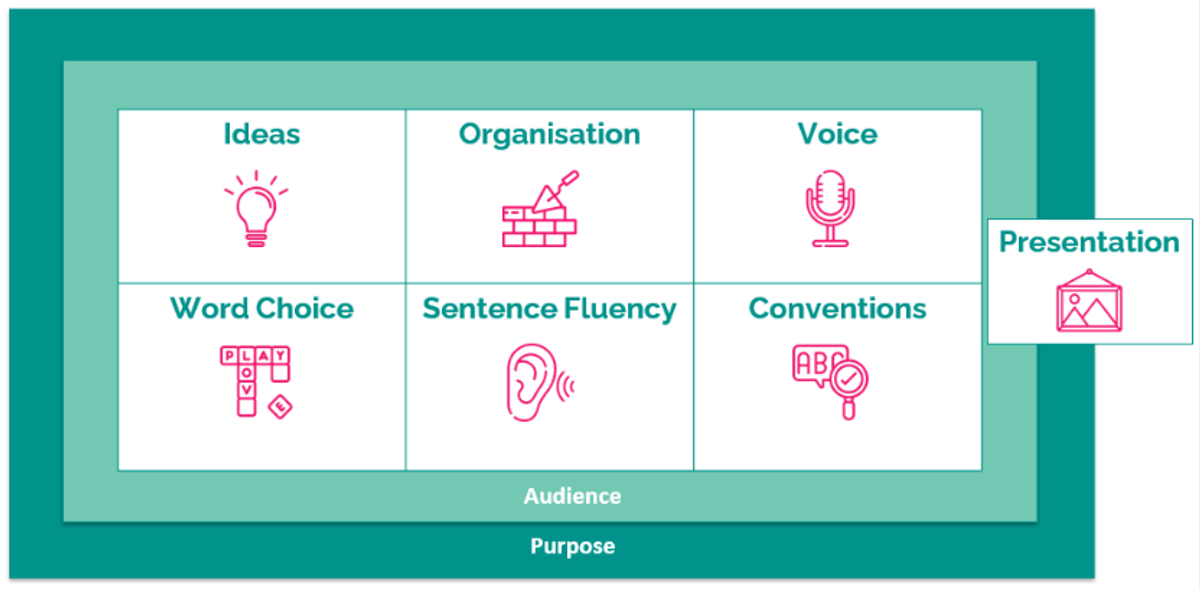Literacy

Vermont Primary School Writing Competition
Vermont Primary Writing Competition!
Over the past few weeks, we’ve been thrilled to receive an overwhelming number of entries for the Vermont Primary Writing competition, which this year centered around the theme of friendship. This theme aligned with our current classroom focus on Friendology, sparking creative expressions of camaraderie and connection among our students.
For our writers in Foundation to Grade 2, the competition offered the opportunity to explore and share their thoughts on friendship, with no word restrictions. Meanwhile, students in Grades 3 to 6 were challenged to encapsulate their stories in precisely 100 words.
We were delighted to receive over 100 entries, each showcasing remarkable dedication and creativity. The variety and depth of ideas presented made the judging process both exciting and challenging.
We are pleased to announce that winners have been selected from each grade level, with some exceptional entries earning honourable mentions for their unique flair. We want to celebrate the effort and enthusiasm of every participant; all entries were valued for their imaginative and thoughtful contributions.
Congratulations to all our young writers for their impressive work and dedication!
Below are the names of the winners and honourable mentions from each level.
Foundation
Winner
Samarth Krishnan
Honourable Mentions
Alice Dalmau
Flynn Souter
Jiya Kothale
Grade 1
Winner
Jerissa Koay
Honourable Mentions
Anna Lee
Jamie Lo
Mira Khatri
Grade 2
Winner
Olivia Xue
Honourable Mentions
Avyukta Anish Krishnan
Myra Khan
Melody Wu
Nikhil Goki
Aswarth Nattamai Senthilnath
Pratush Atreya
Sayesha Sood
Suvidhi Bhat
Grade 3
Winner
Alice Duan
Honourable Mentions
Lucy Portell
Kaira Baxi
Kate Lee
Grade 4
Winner
Yoyo Mao
Honourable Mentions
Vinisha Brahmkshatriya
Joffrey Wong
Amber Shan
Grade 5
Winner
Lydia Yang
Honourable Mentions
Sophia Lai
Nammi Boddu
Anushka Negi
Grade 6
Winner
Hiya Dutta
Honourable Mentions
James Kim
Harris Wong
Johar Khatti
Once again, a big congratulations to everyone who took part. The enthusiastic response to this competition has been fantastic, and we’re excited to host more events like this in the future.
MS Readathon
Throughout August, a large number of our students participated in the MS Readathon. This annual event not only promotes a passion for literature but also raises vital funds for Multiple Sclerosis research and support.
We are excited to share that our school has raised an impressive $500 this year. This achievement is a testament to everyone's hard work and generosity.
We would like to acknowledge two outstanding fundraising efforts. Kyri from 2JH raised over $200 for the cause and Aiden from 5SD raised over $100.
A huge well done to everyone who participated!
Understanding the Ideas Trait in Writing
Highlighting the Ideas Trait in Writing
At Vermont Primary School, one of the core elements we focus on in our writing curriculum is the Ideas trait. This essential aspect helps students develop and convey clear, compelling ideas in their writing, ensuring their work is engaging and insightful.
What Is the Ideas Trait?
The Ideas trait refers to the strength and clarity of the content in a piece of writing. It involves how well a writer generates and develops ideas, and how effectively these ideas are expressed. Strong ideas are well thought out, relevant, and provide meaningful insights or details that capture the reader's interest.
How We Develop Ideas in the Classroom
In our classrooms, we employ several strategies to help students enhance their ability to generate and present strong ideas:
Brainstorming and Planning: We encourage students to use brainstorming techniques and planning activities to explore and organise their thoughts before they start writing. This helps them generate a range of ideas and choose the most compelling ones to develop further.
Focused Topic Development: We guide students in developing their ideas by narrowing down broad topics into more specific, manageable ones. This focus helps them create more detailed and engaging content.
Supporting Details: Students learn to support their main ideas with relevant details, examples, and explanations. This strengthens their writing by adding depth and clarity to their ideas.
Critical Thinking: We teach students to critically evaluate their ideas and those of others. By discussing and analyzing various perspectives, they learn to refine and enhance their own ideas.
How Parents Can Support Idea Development at Home
Parents can play a vital role in helping their child develop strong ideas in their writing. Here are some ways to support this growth:
Encourage Brainstorming: Before your child starts writing, encourage them to brainstorm ideas. They can use lists, mind maps, or drawing to explore different possibilities and decide which ideas to pursue.
Discuss Topics and Themes: Talk with your child about different topics and themes they are interested in. Help them explore these ideas in more depth and consider how they might develop them into a piece of writing.
Ask Thought-Provoking Questions: When discussing your child’s writing, ask questions that encourage them to think more deeply about their ideas. For example, “What makes this idea interesting?” or “How can you add more detail to support this point?”
Provide Examples: Share examples of writing with strong ideas, whether from books, articles, or even advertisements. Discuss what makes the ideas compelling and how they are presented effectively.
Celebrate Creativity: Celebrate your child’s creative ideas and encourage them to continue exploring new topics and themes. Praise their efforts and help them see the value in developing and expressing their unique ideas.
Fortnightly Segments
Writing Challenge
If your child enjoys their writing and is keen to write for enjoyment at home, below is a prompt that you could ask your child to write about.
You can breathe underwater and swim like a fish. What will you do with your new power?
Comprehension Question
This fortnight’s questions are:
- Did this book hold your interest? Why?
- Did the book leave you with any unanswered questions?



